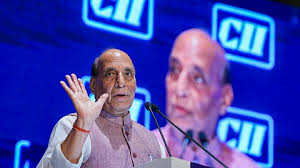‘People in PoK part of Indian family, will return to India voluntarily’: Rajnath Singh

New Delhi:
Defence Minister Rajnath Singh delivered a powerful message at the Confederation of Indian Industry (CII) Business Summit in New Delhi on May 29, 2025. He stated that residents of Pakistan-occupied Kashmir (PoK) are part of India’s extended family. He also expressed confidence that they would return to India on their own in the future.
Singh’s statement rekindled national sentiment and stirred fresh discussions on India’s territorial unity. His words showed a shift in tone—away from confrontation and toward emotional reunification.
PoK: More Than a Disputed Territory
Singh addressed the people of PoK as family members separated by circumstances. “They are our own. We have full faith that our brothers and sisters in PoK will return to us by listening to their inner voice,” he said.
This approach focused on emotional bonds rather than political pressure. Singh emphasized love and cultural ties as tools for future reunification. His words suggested that unity could be achieved through understanding rather than force.
Partition and the Ongoing Dispute
PoK became part of Pakistan after the 1947–48 war between India and Pakistan. Although the princely state of Jammu and Kashmir had legally joined India, Pakistan occupied a portion by force.
Since then, India has consistently claimed PoK as part of its sovereign territory. Diplomatic talks and United Nations resolutions have failed to resolve the issue. Singh’s remarks reinforced India’s position: PoK belongs to India, and its people will one day return willingly.
Winning Hearts, Not Just Borders
Instead of using strong military terms, Singh spoke of unity through emotional connection. He said, “Only a few people in PoK are misled. Most still feel connected to India.” This statement counters the narrative that PoK residents have turned against India.
India’s strategy now includes winning the hearts of people across the border. Singh believes love and truth can overcome the barriers of history and politics. His words aim to inspire hope rather than fear.
India’s Rising Defense Strength
Along with emotional unity, Singh highlighted India’s growing defense capabilities. He noted that India’s defense exports rose from under ₹1,000 crore a decade ago to ₹23,500 crore in 2024–25. This growth signals a strong and self-reliant defense sector.
Singh also referred to Operation Sindoor, where Indian forces used indigenous technology for precision strikes on terror camps. Although he didn’t link the operation directly to PoK, the message was clear—India is ready and equipped to protect its interests.
Public Reaction and Political Context
Singh’s statement triggered strong reactions across the country. Many citizens saw it as a sign of a united India on the horizon. Social media buzzed with hashtags like #PoKIsIndia and #UnitedIndia.
The remarks also align with the Modi government’s larger goals. After revoking Article 370 in 2019, which gave special status to Jammu and Kashmir, the government has focused on full integration of all Indian territories.
Singh’s vision fits within that framework. His call for voluntary reunification complements the legal and administrative steps taken in recent years.
Challenges on the Ground
Despite the positive message, several obstacles remain. Pakistan continues to control PoK with a strong military presence. Free speech is restricted, making it hard to understand the true feelings of the local people.
There have been reports of dissatisfaction in PoK. People have complained about poor infrastructure, lack of jobs, and limited civil liberties. However, without open communication, these voices remain unheard.
Still, Singh believes that truth will prevail. He trusts that when people are given the chance, they will choose unity with India over isolation under Pakistan.
Hope for the Future
Singh’s message goes beyond politics. It speaks to the idea of national healing. He believes that reunification will happen not through war or pressure, but through emotional connection and mutual respect.
His words reflect a strategy based on dignity, not domination. “The day is not far,” he said, “when our separated brothers and sisters will return to us.”
This vision ties into India’s long-standing values of peace, family, and cultural unity. It offers a hopeful path forward—one where divided lands can reunite through love and truth.
Conclusion
Rajnath Singh’s statement on PoK marks a significant moment in India’s approach to territorial unity. By calling PoK residents part of the Indian family, he emphasized emotional connection over conflict.
His message blends strength with compassion. It sets a tone for reunification that is rooted in peace and national pride. While challenges remain, the idea of voluntary return offers a powerful and peaceful vision for the future.






